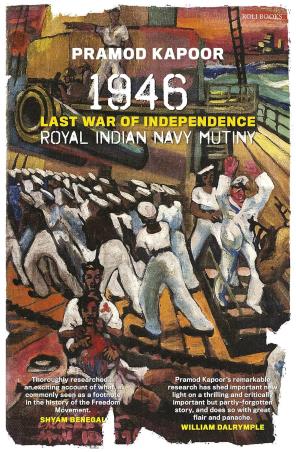


Check Delivery
In 1946, 20,000 non-commissioned sailors of the Royal Indian Navy mutinied. They were inspired by the heroism of the Azad Hind Fauj. But their anger was sparked by terrible service conditions, racism, and broken recruitment promises. In less than 48 hours, 20,000 men took over 78 ships and 21 shore establishments and replaced British flags with the entwined flags of the Congress, the Muslim League, and the communists. The British panicked and announced a Cabinet Mission to discuss modalities of transfer of power. By this time, Indian troops had refused to fire on the ratings, and the mutiny sparked revolts in other branches of the armed forces. The young ratings presented a charter of demands, even as they fought pitched battles against British troops. People thronged the streets in support, and hartals were followed by street fights between civilians and British soldiers resulting in over 400 deaths and 1,500 injured. To quell the rebellion, British commanded their powerful warship HMS Glasgow to sail rapidly from Trincomalee and ordered low sorties by the Royal Air Force fighter planes. In retaliation, the ratings trained the guns mounted on the captured ships towards the shore, threatening to blow Gateway of India, Yacht Club, and the dockyards. As violence escalated, telegrams flew between the Viceroy?s office and the British Cabinet. The British realized they could no longer hold India by force. While the communists continued to support the rebellious ratings, the Congress and the Muslim League persuaded them to surrender, promising they would not be victimized. Shamefully, years later, the governments of India and Pakistan refused to honour those promises after Independence. The mutiny caused public disagreements between Gandhiji and Aruna Asaf Ali, and between Sardar Patel and Nehru. Historians say it accelerated the transfer of power. But this seminal event, which inspired songs, art and theatre has been edited out of the popular narratives of the Freedom Movement.
| Author | Pramod Kapoor |
| Publisher | Roli Books |
| Language | English |
| Binding Type | Hardcover |
| Non Fiction | History & Politics |
| ISBN13 | 9789392130274 |
| SKU | BK 0192058 |
A handpicked list of products which has touched millions

Fast Shipping On All Orders

30 Day Money Back

Technical Support 24/7

All Cards Accepted
© Copyright 2022 | GetMyBook.com All Rights Reserved.